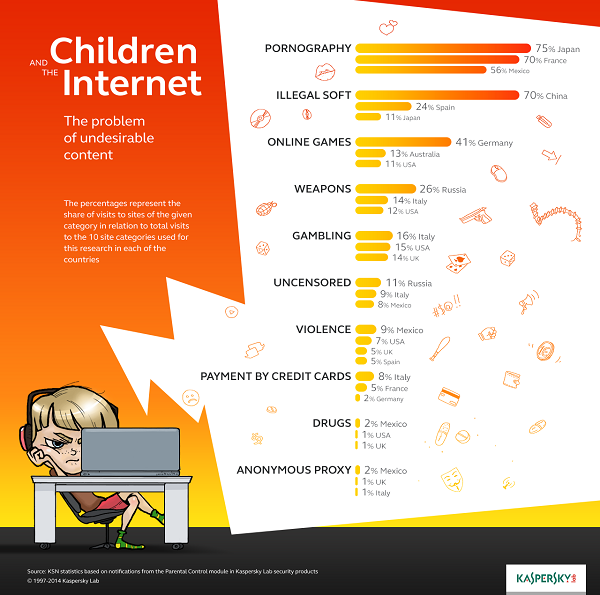Kaspersky Lab analyzed the Internet search patterns of young users
Every year more and more children go online. Most parents are perfectly aware that there are sites that contain pornography, show images of violence, promote drug-taking, and show other undesirable content. However, not every parent can imagine which particular categories of such undesirable sites children tend to visit most, or how often. So Kaspersky Lab decided to find out by analyzing the Internet search patterns of young users.
Ten categories of undesirable website content were chosen for the investigation, as follows: pornography and erotica, illegal software, narcotics, cruelty and violence, strong language, weapons, gambling, anonymous proxy servers, payment systems, and online games.
The Forbidden 10
Parents traditionally deem three categories of undesirable content especially undesirable for their children. These are: pornography and erotica, cruelty and violence, and narcotics. With regard to these three, the investigation returned the following findings:
- In nearly in all countries, the ‘pornography and erotica’ category – by a large margin – leads in the visit-ratings based on notifications from Kaspersky Lab’s Parental Control module. The highest percentages of visits to sites with pornographic/erotic content were in Japan (74.9%) and in France (68.9%). Number three was Mexico (56.3%).
- Sites belonging to the category of ‘cruelty and violence’ are visited most often in Mexico (8.6%) and the USA (7%), and in Europe – specifically in the UK and Spain (both 4.8%). Based on Parental Control statistics, the popularity of sites in this category is relatively low. Nevertheless, it’s worth pointing out that getting to such sites accidentally is practically impossible: they need to be located on the Internet intentionally. Accordingly, even these low percentages of visits to sites of this category can signal to parents a degree of danger and be a cause for concern.
- Sites in the ‘narcotics’ category, like those in the ‘cruelty and violence’ category, are visited most often in Mexico (1.8%) and the USA (1.4%). In third place comes the UK (0.9%).
Illegal software is especially popular in China, and so in this country this category is way in front from the rest (69.4%, against the 24% of the nearest ‘competitor’ – Spain, and the 10.6% of Japan). Extra danger posed by sites in this category lies in the fact that on sites offering illegal software malware is very often is distributed too.
Indicators of other categories
- Strong language: Russia (10.7%), Italy (9%), Mexico (7.7%)
- Weapons: Russia (26.4%), Italy (13.7%), USA (12%)
- Gambling: Italy (15.7%) USA (15.4%), UK (13.5%)
- Anonymous proxy-servers: Mexico (2.1%), UK (1.2%), Italy (0.8%)
- Credit card payments: Italy (8.5%), France (5.5%), Germany (2%)
- Online games: Germany (41.1%), Australia (13.4%), USA (11.2%)
Commenting on the findings, Anna Larkina, Senior Web Content Analyst at Kaspersky Lab, said: “Besides unwanted content, the Internet brings with it other dangers no less damaging for children, for example cyber-bullying or cyber-trolling. Aggressors can exploit all possible channels of online interaction – including social networks, forums, chats and messengers – which when used together can cause victims untold mental suffering. Technically, the fight against cyber-trolling is not so simple, so Parental Control is not so effective against it. As a rule children are not able to cope with aggressors on their own; therefore, parents have an important role to play in the protection of children from cyber-bullying. Ideally, parents need to pay attention to their children’s Internet activity.”
More information can be found at securelist.com.
1 Data were taken from KSN statistics based on notifications from the Parental Control module in Kaspersky Lab security products permitting analysis of the categories of undesirable site content which children reach most often. These statistics are collected anonymously, and regardless of whether a given category is deemed dangerous by parents and thus blocked by Parental Control.
2 The percentages represent the share of visits to sites of the given category in relation to total visits to the 10 site categories used for this research in each of the countries.

